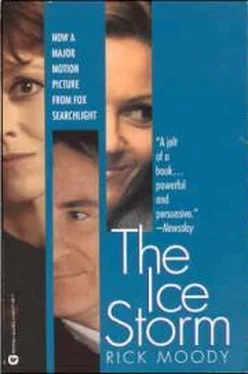Rick Moody - The Ice Storm
Здесь есть возможность читать онлайн «Rick Moody - The Ice Storm» весь текст электронной книги совершенно бесплатно (целиком полную версию без сокращений). В некоторых случаях можно слушать аудио, скачать через торрент в формате fb2 и присутствует краткое содержание. Город: New York, Год выпуска: 1997, ISBN: 1997, Издательство: Warner Books, Жанр: Современная проза, на английском языке. Описание произведения, (предисловие) а так же отзывы посетителей доступны на портале библиотеки ЛибКат.
- Название:The Ice Storm
- Автор:
- Издательство:Warner Books
- Жанр:
- Год:1997
- Город:New York
- ISBN:0-446-67148-7
- Рейтинг книги:4 / 5. Голосов: 1
-
Избранное:Добавить в избранное
- Отзывы:
-
Ваша оценка:
- 80
- 1
- 2
- 3
- 4
- 5
The Ice Storm: краткое содержание, описание и аннотация
Предлагаем к чтению аннотацию, описание, краткое содержание или предисловие (зависит от того, что написал сам автор книги «The Ice Storm»). Если вы не нашли необходимую информацию о книге — напишите в комментариях, мы постараемся отыскать её.
The Ice Storm — читать онлайн бесплатно полную книгу (весь текст) целиком
Ниже представлен текст книги, разбитый по страницам. Система сохранения места последней прочитанной страницы, позволяет с удобством читать онлайн бесплатно книгу «The Ice Storm», без необходимости каждый раз заново искать на чём Вы остановились. Поставьте закладку, и сможете в любой момент перейти на страницу, на которой закончили чтение.
Интервал:
Закладка:
Elena said nothing about this or other matters, and not just because she had found in this village of Republicans — Republicans all the way back to Garfield — that she couldn’t articulate her own opinions without appearing foolish, but because she came by this silence through experience.
Her Irish forebears went from the kind of trash you eighty-sixed from a riverside saloon to the sorts of people who repealed the Volstead Act. They folded rags-to-riches fabrications so deeply into their recollections that they believed their own public relations. Or that at least was her father’s way. Her father had been a newspaperman, a publisher of cheap tabloid philosophies. He had worked his way through a Midwestern journalism school moonlighting as a soda jerk. He had hopped a freight train east. Started in the mail room. He had married his high-school sweetheart.
The strain of bearing up under this tabloid myth led to the mute intolerance of her father’s household. You could take the Irish out of the saloons, but not the saloons out of the Irish. Their hearts were caves of doubt. Edwin O’Malley was a two-fisted drinker, a collector of fine wines, but his wife, Margaret, Elena’s mother, slipped behind the curtain of alcoholism before Elena even graduated from elementary school. Margaret couldn’t communicate in the palaces and mansions that the O’Malleys frequented during the Depression. Her tongue was tied. Chat failed her. She was like the rat balking at the maze.
Her father didn’t mince words: You look like hell. Jesus Christ, you look like hell. Why bother to come down here? You can’t even walk — how are you going to feed yourself. You’re drunk and you can’t even walk. You’re a disgrace. Damned disgrace.
It seemed to Elena that she was always waiting for her mother to come downstairs. Her parents had separate rooms, of course; they never slept together. When her mother limped downstairs for dinner, it was often the first they had seen of her that day. Elena hid behind servants and furniture and she listened. She stored away the results. She repeated phrases of affection and hatred alike, until she couldn’t tell one from the other, couldn’t tell derision from respect, a beating from a fond hug. Once, a friend of her father’s visited: Oh, Margaret, lovely to see you, you look marvelous. To which her father had replied, Jesus, Karl, don’t you have eyes?
That was her mother. Her mother fell down the staircase and they left her there, at her father’s instructions. Her mother disrobed on the front lawn. Her mother locked herself into a shed, looking for stashed treasure. She might have stayed there for days, if it hadn’t been for the gardener.
Margaret O’Malley lost a little bit of herself every evening. She turned to climb the stairs again, after each episode of humiliation, until there was no dignity left, no character to assassinate, until she no longer had to climb because it was too dangerous. A primitive home escalator was installed, at great expense.
Her father made sure Elena knew about her mother’s condition. He called her down from her room to witness each infraction against him, against his success. So when she was a child and her mother tried to take her own life with sleeping pills, he induced vomiting, called for an ambulance, and then brought Elena into the bedroom. Margaret O’Malley was soiled and unconscious. Shit and piss and bile puddled around her, in her linen, spattered on the rug. This is your mother. Go ahead. Look.
It was the holidays that always brought her back to this past.
She had left home with the mixed feelings anyone might have. By the early sixties, her mother often threatened to take her own life. Elena calmly woke Benjamin and, as the sun rose, she caught the first train to New Haven, to the airport there. The threats had always evaporated by the time she arrived. Her mother was asleep, or on her bed, placidly doing a crossword puzzle, drinking gin and smiling.
They dried out Margaret and then released her to the world. Dried her out and released her again. It was like any annual occurrence, like a harvest or saint’s day. They dried her out, and all were hopeful for a couple of weeks, even her father would seem to be of good cheer, and then her mother would drink again — sometimes she would even toast returning to the house — and soon it was back to the weekly delivery of cases. Elena’s father paid for her detoxifications and for her wardrobe and the tabs at each and every liquor store and for the long-distance telephone calls, and he paid extra to have her bathed and cared for at home. All the bills were paid.
Had it been just the three of them, there would have been cause enough to leave Weston, Mass. But she had a brother, too. A carbon copy of his father — as stable as some inflammable gas — full of impatience and hate. And he drank like his mother. He was the most difficult man Elena had ever met. He actually argued about the weather. His sense of rectitude was so finely tuned that he lay awake nights ordering and enumerating worldly infractions according to a code he could never observe himself. Billy O’Malley was ten years older than Elena and he had taken her education entirely into his own hands. He claimed even to have named her himself, according to rules of prosody. Two bacchic feet. Elena O’Malley. No middle name. She’d just get rid of it later. He’d named her for Bacchus. Her parents were mostly busy anyway.
Instructing her in water safety, he had pushed her, as an infant, into the swimming pool. She sank. Instructing her in etiquette, he had removed her elbows from the supper table with the sharp side of a steak knife. She took a number of stitches. Instructing her in respect for her elders, he’d dangled her by the ankles from a third story window. Instructing her in the management of local mass transit, he’d abandoned her blindfolded in downtown Boston.
Elena had been a good student. Thanksgiving dinner at the O’Malleys, as Benjamin had often pointed out, was like waiting for the end of a cease-fire. Billy and her father would assume a guarded silence until the first drinks had been consumed. Then Billy would launch into his list of dissatisfactions beginning with, say, her father’s preposterous support for the House Un-American Activities Committee. Open disgust was not far away. Elena tried to interpret, mediate, and assuage; she tried silence and she tried slipping out to chat with the staff in the kitchen. It did no good. And then her mother would appear for dinner, having spent hours arranging herself, balancing between the spot where she couldn’t button a button because of tremors and where the double vision got the best of her. Elena’s mother would descend and the evening would really get under way. Holy mother of God, why did you even bother to attend? Will someone call for a bib, please? Or a stretcher? Maybe a stretcher is in order. Could we have a stretcher, please?
At which Billy would fly into a rage. Because Billy and Elena’s mother were attached by more than drink. They were attached by their sadness and their lying and their self-pity. They died in the same year, the way lovers of long standing did. Margaret O’Malley’s liver succumbed, and Bill went down in a plane about six months later. Plaques commemorating their unhappy terms in this life adorned the stone wall in a lonely New England churchyard. And these plaques had been joined recently by one bearing her father’s name. He had supported Nixon right through Checkers, but the flimsy valves of his heart-tinkered with by the eminent cardiologists of the day — couldn’t survive Watergate. He died the day Cox was appointed special prosecutor, April 17.
When Elena was small, she had played in her mother’s dressing room, where two mirrored walls faced one another. The reflections traveled back ceaselessly in that space. When Elena stepped into the purview of these mirrors, she too was reproduced innumerably. She was always trying to catch a glimpse of her incalculable selves. She stretched, she sensed, toward the origin of her family, into its pedigreed peeves and illnesses and delinquencies. But no matter how she tried to sneak around the margins of her reflection, to see the edges of that parade, her mirrored self shadowed her. In silence.
Читать дальшеИнтервал:
Закладка:
Похожие книги на «The Ice Storm»
Представляем Вашему вниманию похожие книги на «The Ice Storm» списком для выбора. Мы отобрали схожую по названию и смыслу литературу в надежде предоставить читателям больше вариантов отыскать новые, интересные, ещё непрочитанные произведения.
Обсуждение, отзывы о книге «The Ice Storm» и просто собственные мнения читателей. Оставьте ваши комментарии, напишите, что Вы думаете о произведении, его смысле или главных героях. Укажите что конкретно понравилось, а что нет, и почему Вы так считаете.












